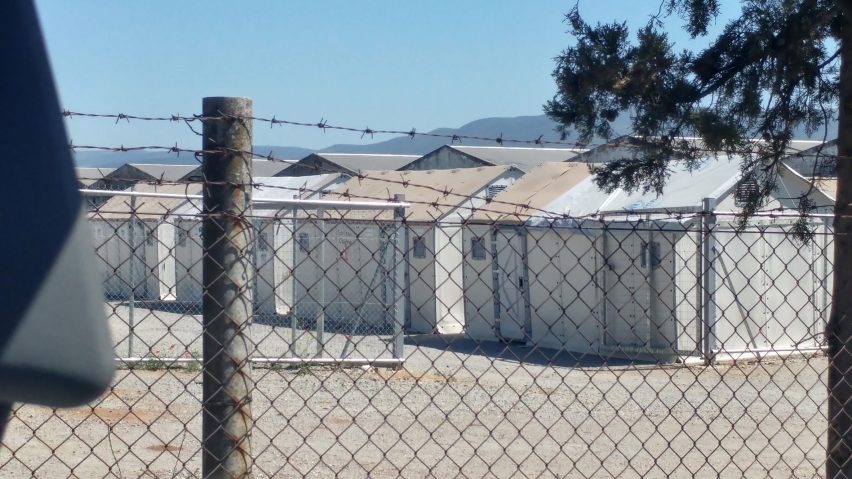Today is the start of Refugee Week, which aims to bring awareness of the millions displaced by conflict or natural disasters. To coincide, we're putting the spotlight on 10 innovative recent design projects that make a positive difference in the lives of refugees.
The UK's Refugee Week began in 1998 as a way to combat the negative media portrayals of refugees and asylum seekers. It takes place around the time of World Refugee Day on the 20 June, and sees a nationwide programme of events intended to bring together and create a level of understanding between communities.
This year's event comes as the refugee crisis has become an increasingly important topic for architects and designers, given the worsening of the situation over the past few years.
From shelters to flags, here are our picks of the best products and installations.
Although it has faced criticism of late, this shelter – developed by IKEA's charitable arm IKEA Foundation – brought the needs of refugees into mainstream design, and went on to win the Design Museum's design of the year award in 2016.
Find out more about Better Shelter by IKEA ›
Flag for Refugee team at Rio 2016 Olympics
This flag was imagined by Yara Said, an artist and Syrian refugee now living in Amsterdam, for the refugee team at the Rio 2016 Olympics. She used black and orange to represent the colour of life jackets worn by refugees when making dangerous sea crossings.
Find out more about the refugee team flag ›
Bag2Work by Didi Aaslund and Floor Nagler
Dutch designers Didi Aaslund and Floor Nagler worked with refugees to create this rucksack from discarded boats and life vests. Designed to offer the most possible space using the minimum amount of material, the 21-litre BAG2WORK bags are made from one square metre of boat rubber and four life-vest straps, which cross over the rucksack to hold it closed.
Find out more about Bag2Work ›
De Voorkamer by Pim van der Mijl
Pim van der Mijl's De Voorkamer project – meaning "the living room" – was designed as a new domestic environment for asylum seekers and locals to socialise, with the aim of helping refugees integrate.
Find about more about De Voorkamer ›
In Limbo Embassy by Manon van Hoeckel
Van Hoeckel's project proposed mobile embassies for stateless people. Here, the refugees themselves worked as ambassadors, with passers-by invited to come in to share their stories and suggest ways refugees can help us – as well as how we can help refugees. The project is designed to make people look differently at the refugee situation, rather than solving it.
Find out more about In Limbo Embassy ›
Universal Unconditional by Stefania Vulpi
Stefania Vulpi, another Design Academy Eindhoven graduate, created a conceptual online system that allows a network of people to temporarily share their nationality. Prompted by her own frustration at Europe's ongoing refugee crisis, she designed a digital platform that would allow people to create profiles, and apply to swap or borrow someone else's citizenship.
Find out more about Universal Unconditional ›
SURI shelter by Suricatta Systems
Shelter Unit for Rapid Installation (SURI) was originally designed to provide shelter after earthquakes, but was also deployed to help house the millions of people fleeing conflicts in the Middle East and sub-Saharan Africa as it is both easy to transport and assemble.
Find out more about SURI shelter ›
SOS Save Our Souls by Achilleas Souras
Artist Achilleas Souras, who is just 16 years old, used hundreds of discarded life jackets collected from the shores of Lesbos to assemble an igloo for Moroso's SOS Save Our Souls installation at Milan design week. "The refugees, the homeless, and the less privileged cannot be 'out of sight, out of mind' anymore," said Souras, who hopes his igloos could eventually be used in rescue operations.
Find out more about SOS Save Our Souls ›
Makers Unite
Makers Unite, which won the Refugee Challenge at last year's What Design Can Do, is an initiative that gets local designers and those with a refugee background together to create products using life vests recovered from Greek shores. "The goal of Makers Unite is to enable dialogue and foster opportunities for understanding and personal growth," said the organisers.
Ai Weiwei created this Lotus-like installation as part of his continued campaign to raise awareness of the Syrian refugee crisis. Entitled F Lotus, the installation at the Belvedere museum in Vienna featured 201 rings – each with five life jackets worn by Syrian refugees – arranged into the shape of the letter F.

